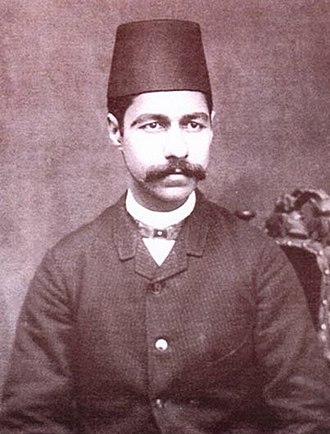Mīrzā Āqā Khān Kirmānī
Mīrzā Āqā Khān Kermānī is undoubtedly one of the most influential and versatile Iranian intellectuals of the late 19th century. Born in Kerman province, he enjoyed a traditional education in Islamic law, Persian and Arabic literature, mathematics, and philosophy. He also learned English and French. In matters of religion, he was under a variety of influences from his parents and teachers, of which his ambivalent understanding of religion in his writings is a reflection. Thus, in some of his writings he is open-minded toward Shia in others critical, and the same is true of Sufism, Ismāʿiliyya, and Zoroastrianism. Most clearly pronounced, in a certain phase of his work, is his turn to Babism, a socio-religious reform movement which emerged in Iran in the 19th century and to whose exegetical literature he contributed. However, this did not prevent him from seeing himself as an agnostic at the same time. Overall, he seems to have viewed the phenomenon of religion as a necessary aspect of human existence, but not to have considered any one denomination as a whole to be persistently convincing. After conflicts with the governor in Kerman, he decided to emigrate to Istanbul in 1884, where he joined a community of exiled Iranians and spent almost the last 10 years of his life. Here he was in contact with other relevant intellectuals. For example, he helped London-based Malom Khān spread his journal Qānūn among Iranians in Istanbul and to establish a Masonic lodge there. For a certain period he supported al-Afghānī in his pan-Islamic ambitions. He also extensively absorbed various currents of European thought and, adapting them, wrote a number of monographs, essays, literary pieces and articles, especially for the exile journal Akhtar, published in Istanbul. When in 1896 Mīrzā Rezā Kermānī, who sympathized with Babism, shot Nāṣir ad-Dīn Shah, Mīrzā Āqā Khān was accused of being involved in the murder plot. That same year, meanwhile under house arrest in Trabzon, he was extradited by Ottoman officials and executed in Tabriz. In the only 10 years of his time in Istanbul and Trabzon, however, he had created a body of work that – although often contradictory in itself – can be considered exemplary for the attempt of an Iranian thinker to receive divergent intellectual currents from Europe and the Islamic world in context. Since his published works did not appear until several years after his death and many of his writings have not been published to date, the question of the reception of his thought poses a particular challenge. All in all, Mīrzā Āqā Khān, who died at the age of 42, left behind an ambivalent body of work that gave intellectual discourse in Iran many impulses on topics such as religious criticism and religious pluralism, the understanding of nation, and also anti-Arab/anti-Semitic racist thinking. The significance and impact of his work for the intellectual history of Iran that followed him, as well as his work in the context of a transregional intellectual history of the Enlightenment, is the subject of the research project TransIranIdee.
